UNSILENCED : A REVIEW
by Alan Harmer
The Evening of 14 October 2000
It was a happy festive evening, gay with songs and laughter. The small
village of Sta. Maria was celebrating its annual fiesta. The central
square was alive with the lights and sounds of games, pop music,
amusement stands and side shows. Delicious smells of aromatic spices and
fresh fried pork wafted into the night air. Everyone was outside
enjoying themselves.
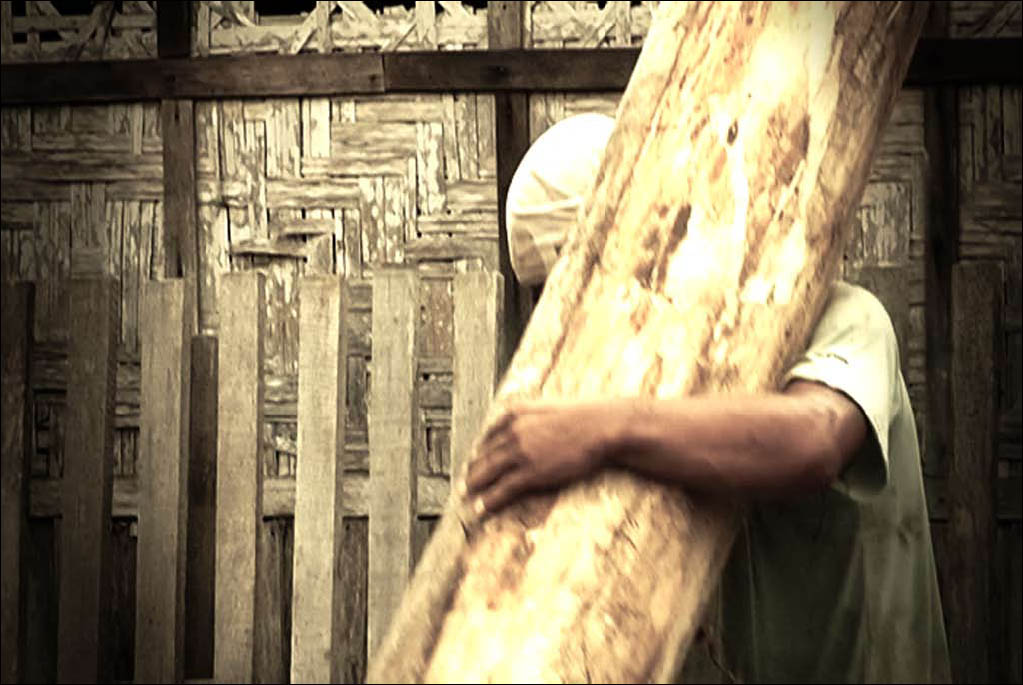
14 October 2000 - An evening that some people will have engraved in
their memory forever…
Sta. Maria is a small community located in the Trento province along the
Pan Philippine highway, that majestic road that cuts its way north-south
across the whole island of Mindanao, in the south of the Philippines. In
the middle of the island, in Trento, the road runs through lush tropical
forest passing the beautiful Agusan marsh wild life sanctuary. It is a
remote region, a relatively poor area, and lack of reliable water
supplies often spreads disease among the indigenous population. The main
employer in the region, apart from the local agriculture is the logging
operation, PICOP (the American-owned, Paper Industries Cooperation of
the Philippines) with 2,000 employees in the area. Their logging lorries
are to be seen frequently, rumbling along the main highway, taking their
precious load of tree trunks down to the factory for processing.
Adjoining the village of Sta. Maria is an army camp, which houses part
of the 62nd Infantry Battalion. There is often agitation with the NPA,
the New People’s Army, and only two weeks earlier, the battalion
commander, Colonel Velasco, had been ambushed and killed by NPA1 militia
from Talacogon, 6 villages away.
In the village square, the crowd was becoming denser by the minute.
Sporting a gleaming white shirt and with his hair especially spruced up
for the evening, Crispin Barot was out looking for his six friends,
Romualdo, Jovencio, Arnold, Joseph, Diosdado and Artemio. A young man of
18 years old, Crispin lived in Sta Maria and worked for PICOP. Through
working in the logging company, he had met these close friends, who came
from the neighboring town of Bunawan.
There they were in the crowd! They greeted one another happily. Laughing
and joking together, they moved out of the village square and drifted
slowly down the road to Jumapoy Joint, a favorite meeting place. The
crowded videoke bar was packed to bursting, almost impossible to enter.
They joined the crowd outside of more than fifty people, dancing and
listening to the loud pop music beaming from the loudspeakers. Suddenly,
a soldier in army uniform accosted Romualdo.
“You are a member of the NPA.”
“I’m sorry I don’t understand,” said Romualdo. “I recognize your face.
You were involved in the killing of Colonel Velasco. Come with me.”
“You must be mistaken,” he said “I’ve got nothing to do with the NPA.”
“He’s not with the NPA,” joined in his friends.
“He’s from our village, we know him well.”
But the soldier produced a pistol, pointed it at Romualdo and pushed him
out to the edge of the crowd. His friends followed. The soldier took him
roughly by the arm and forced him down the road, frog-marched him with
the pistol in his back. His five friends followed, protesting, “It’s not
him.” Crispin went along behind. He was scared and hung back. Other
soldiers, some in uniform, some armed, joined in and herded the six
young men towards the army camp, only a short distance down the road.
Crispin watched dismayed as his friends went through the main gates,
uncertain what to do; just then his uncle pulled him away and told him
not to venture into the army camp but to go home.

Where did the young men disappear to?
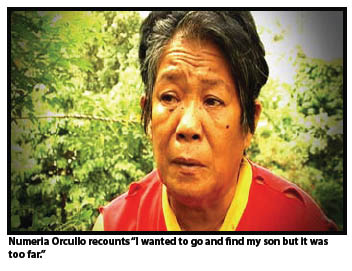 The
following day, the young men had not returned to their village. Their
families started wondering why they were not back home. Crispin
recounted how they had been marched to the army camp and had been taken
inside. Two people from the families, Artemio Ayala and Macaria Legare
immediately went off to the camp to find out what had happened. They
were not allowed in. Others members of the family went there, the
mothers of the young men, in tears, but all were turned away roughly, or
barred at the gate. Finally, six days later, a delegation of the parents
accompanied by the mayor of their village, the vice-mayor and a barangay
captain went to the army camp requesting to speak to the commanding
officer. They were allowed in but the army denied anything to do with
the young men. The families were shown round the camp. There was no
trace of their lost sons. Crispin Barot and the families of the missing
men made written statements with the local police. The military
continued to deny any involvement and all knowledge of the whereabouts
of the young men.
The
following day, the young men had not returned to their village. Their
families started wondering why they were not back home. Crispin
recounted how they had been marched to the army camp and had been taken
inside. Two people from the families, Artemio Ayala and Macaria Legare
immediately went off to the camp to find out what had happened. They
were not allowed in. Others members of the family went there, the
mothers of the young men, in tears, but all were turned away roughly, or
barred at the gate. Finally, six days later, a delegation of the parents
accompanied by the mayor of their village, the vice-mayor and a barangay
captain went to the army camp requesting to speak to the commanding
officer. They were allowed in but the army denied anything to do with
the young men. The families were shown round the camp. There was no
trace of their lost sons. Crispin Barot and the families of the missing
men made written statements with the local police. The military
continued to deny any involvement and all knowledge of the whereabouts
of the young men.
This is the point at which most accounts about disappearances come to an
abrupt end.
In not knowing what happens to the people who disappear;
In the blanket denial of the military, the police, and government
officials to admit anything;
In the refusal of the authorities to investigate the case;
In the lack of witnesses because they are scared to come forward and
disclose any information;
In the forgotten tragedies of the individual families;
In the terrible pain of the memories of those who are missing;
In the unresolved loss and grief…
This is normally where such tragic histories end.

The Film, UNSILENCED
The scene opens with the magnificent scenery of the Trento province,
dense green forests, palm trees waving in the wind and the broad
fast-running river. The ordinary life of the villagers, their simple
routine, their attractive faces…
Numeria Orcullo says “It is a simple life here, we are a peaceful
people.”
The families go on to talk about their sons, and the work they did in
the logging company. Then they hear the news, their disbelief that the
young men are really missing, the panic and the fear.
Numeria Orculla recounts, after she was told her son was missing “I
wanted to go and find him but it was too far. I am not familiar with
that place.”
Later on, with the other families desperately trying to trace the young
men, “We searched for them on foot, day and night, for a week…”
She tried hard to gain access to the army camp. In tears, she describes
her treatment at the ruthless hands of the army. Here, in a few simple
images and a few simple words is the whole tragedy of disappearances.
Seeking Justice
There, the tragedy might have ended had it not been for FIND (Families
of Victims of Involuntary Disappearance) who read about the incident in
the local paper: Rose Deano from FIND visited the families of the young
men. It needed several visits to gain their confidence, and to insist on
the importance of action, and to reassure them that they would be helped
in their cause. With the support of FIND, the families filed a court
case against the army.
The initial hearing in the court was rejected.
However, four years later, an important witness emerged. Exequias
Doyugan, an army sergeant, had witnessed at first hand the killing of
the young men but had chosen to remain silent, afraid that he would be
killed. At 41 years old, he had been in the army since 1988. He left in
2007. With encouragement from FIND, he resolved to speak out. The army
discovered this, and in August 2007, an envoy on behalf of the Captain
of the 4th Infantry Battalion tried to persuade him to rejoin the army
and offered him 200,000 pesos to remain silent. Doyugan decided, with
strong backing from FIND, to tell the truth.
A court case was filed in the Regional Court at Prosperidad, Agusan del
Sur, against Corporal Rodrigo Billones, the army soldier who had
arrested Romualdo and brought him to the army camp. He was easily
identified by Crispin Barot and others as the person initially
responsible for abducting the young men.
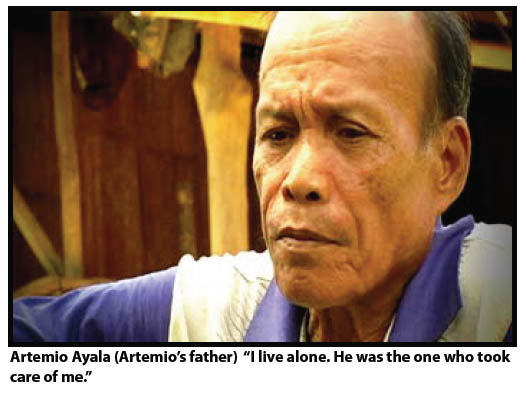 In
court, Doyugan, as key witness, said that on the night of the killings,
the army camp was very quiet. Many of the soldiers had gone to the
village fiesta. The commanding officer, Colonel Cabando, was away from
the camp. Doyugan overheard a telephone conversation between the camp
Senior Officer and Cabando telling him that they had found some possible
members of the NPA. Cabando said that they should kill the suspects. The
young men entered the camp, they were tied with rope and manhandled by a
number of soldiers. One of the soldiers struck Arnoldo on the head with
an iron pipe. Three other soldiers joined in and together they beat the
six young men to death. The soldiers dug graves at the back of the
extension building and buried the bodies. However, three days later,
they dug them up and took them away in a Chevrolet service vehicle to a
point along the road in Trento and burned the corpses there. Doyugan
said that Billones had nothing to do with the killing, the digging up of
the corpses and the burning.
In
court, Doyugan, as key witness, said that on the night of the killings,
the army camp was very quiet. Many of the soldiers had gone to the
village fiesta. The commanding officer, Colonel Cabando, was away from
the camp. Doyugan overheard a telephone conversation between the camp
Senior Officer and Cabando telling him that they had found some possible
members of the NPA. Cabando said that they should kill the suspects. The
young men entered the camp, they were tied with rope and manhandled by a
number of soldiers. One of the soldiers struck Arnoldo on the head with
an iron pipe. Three other soldiers joined in and together they beat the
six young men to death. The soldiers dug graves at the back of the
extension building and buried the bodies. However, three days later,
they dug them up and took them away in a Chevrolet service vehicle to a
point along the road in Trento and burned the corpses there. Doyugan
said that Billones had nothing to do with the killing, the digging up of
the corpses and the burning.
The case was judged on 11 July 2008. Corporal Rodrigo Billones was
convicted for unlawful arrest and illegal detention of the 6 men. He was
sentenced to a maximum of 15 years imprisonment. The other army
personnel, officers and soldiers in the crime are now being
investigated.
The Victims
The six men from Bunawan village, who disappeared, were:
Romualdo Orcullo (27 years old)
Arnold Dangquiasan (29 years old)
Joseph Belar (31 years old)
Diosdado Oliver (30 years old)
Artemio Ayala (29 years old)
Jovencio Legare (41 years old)
A Landmark Case
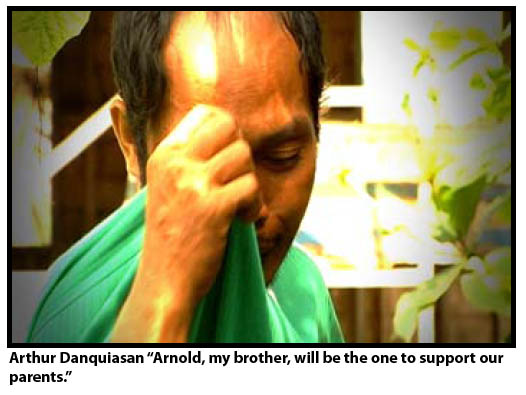 Nilda
Sevilla, Chairperson of FIND, says “The PICOP case is unique in the
sense that it is a landmark victory in court with the conviction of the
accused army corporal as accomplice to the crime of kidnapping and
serious illegal detention of the six paper factory workers. But what is
more important is the conviction of the principals, the military men and
members of the 62nd infantry battalion. Now they have filed a case
before the office of the prosecutor in Agusan for multiple murder,
serious illegal detention, coercion and torture. These are existing
crimes punishable under the Revised Penal Code.”
Nilda
Sevilla, Chairperson of FIND, says “The PICOP case is unique in the
sense that it is a landmark victory in court with the conviction of the
accused army corporal as accomplice to the crime of kidnapping and
serious illegal detention of the six paper factory workers. But what is
more important is the conviction of the principals, the military men and
members of the 62nd infantry battalion. Now they have filed a case
before the office of the prosecutor in Agusan for multiple murder,
serious illegal detention, coercion and torture. These are existing
crimes punishable under the Revised Penal Code.”
“However not one of these crimes captures all the elements of enforced
disappearance, especially the element of concealment, of the fate and
whereabouts of the victim. So enforced disappearance is enforced
disappearance; it is not kidnapping and illegal detention. What is
important is for the phenomenon of Enforced Disappearance to end.”
The Need for Government Laws against Enforced Disappearances
The documentary film is a joint production between FIND and AFAD. It is
valuable in detailing the whole story of the PICOP case: the abduction
of the six men, the disappearance, and the killing. It interviews the
families of the disappeared. It recounts the actions of the families
taken against the army and the resulting successful court case.
The main conclusion is that it is vital for the Philippine government to
ratify the International Convention against Enforced Disappearance and
to enact local laws to guarantee security for all their citizens and
justice to eliminate Enforced Disappearances.
The film is available from the AFAD office, Rooms 310-311 Philippine
Social Science Center, Commonwealth Ave., Diliman, Quezon City,
Philippines and in the AFAD website:
www.afad-online.org
(Click
here to watch movie)
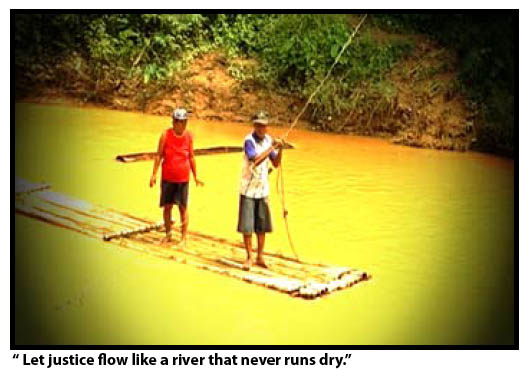

Alan Harmer is a human-rights supporter in Geneva. Over the last twelve
years he has been host to members and friends from AFAD who come to
participate in meetings at the United Nations.